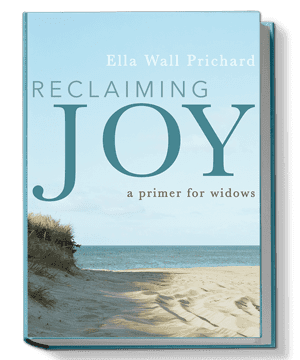Ella Wall Prichard didn’t set out to someday write a book about navigating widowhood. In fact, she admits being quite unprepared for this stage of life thrust upon her when her husband Lev died in 2009.
“Nothing prepared me for widowhood, “ she confesses in Reclaiming Joy: A Primer for Widows, a timely and helpful resource to be released in September by Baylor University Press under its 1845 Books imprint.
Ella, who lives in Corpus Christi, Texas, acknowledges that some of her challenges differ from others following the loss of spouse. While overwhelmed with business and other financial decisions, she had an aspect of security many widows do not.
However, the emotional shock and ensuing journey of being suddenly alone have enough similarities that her empathetic heart, reflective mind and guiding hand will be well appreciated. Ella offers each of those in her honest sharing of the struggles, adjustments and points of peace over the past nine years.
Perhaps her most honest confession among many: “I never considered myself a needy person, but now I needed so much: to surround myself with advisors whom I trusted; to learn to ask for help; to lay aside my pride and admit that I did not understand; to extend and receive grace.”
Ella is a friend with whom I keep up via social media and occasionally in person, and therefore have observed some of her personal experiences and reflections through this journey. She always brings her analytical mind and clear communication skills to both conveying her personal experiences and to interpreting them in ways that bring understanding to others.
A focused look at widowhood, this book is drenched in honesty and wise insights as she continues to move through stages of grief while adapting to new realities. These are experiences and discoveries worth sharing with fellow travelers who face such a reality now — or will in the near future.

Ella blogs at ellawallprichard.com. Her upcoming book may be pre-ordered from links on this site.
Ella’s deep Christian faith is evident — and appealed to — in this honest rendering of facing loss and change. Yet it is a mature approach that doesn’t pretend to offer easy answers or prescribe a simple plan to escape the pain of loss.
“In the months after Lev’s death, I found comfort reading the Apostle Paul’s Letter to the Philippians, along with the Psalms and the Gospel of John,” writes Ella, confessing earlier in the book that she turned to prayer and scripture in desperation. “In those quiet moments, I found a peace that I could not find anywhere else.”
Ella is personal and practical in sharing ways she faced the early challenges of widowhood, as well as the winding ways that followed. She writes of assuming unexpected business and personal responsibilities now left to her, and so often being alone.
She doesn’t shy away from terms like “overwhelmed” and “bewildered” to describe honest feelings resulting from navigating this stage of life. But she also offers hope — not the shallow masking of feelings, but the reality of new life experiences even when facing them produced more anxiety. Many of these hard, yet brave and constructive acts came by engaging in social settings as a solo.
“Abundant living,” she notes, comes not from the accumulation of things but “from an abundance of good friends, meaningful relationships, and purposeful life.”
Ella’s story, while unique to her experiences, takes readers along familiar steps for many who travel the trail of this particular kind of loss. She concludes each chapter with a summarized “lesson learned.”
Amid the losses she identifies gains that can be challenging yet freeing. Beyond the overwhelming sense of loss of companionship, she notes, comes an independence not of one’s own making. Ella calls this newly presented freedom: “God’s compensation.”
While she missed the accustomed feedback, Ella said she found herself with a new freedom in which she no longer had to consider someone else’s schedule or opinion. Simply, she could use her time and resources in the way she chooses. This independence is even greater, she notes, for those who have been in a long-term, care-taking role.
Yet she wisely warns: “The danger is that that the line between freedom and self-centeredness is a very fine one.”
Hence this lesson learned: “In being more concerned for the welfare of others than ourselves, we forget our own needs and pain and discover the joy of serving and giving.”
Astutely, Ella sheds needed light on finding the benefits of solitude over the devastation of loneliness. Whether attending church or social functions, traveling or being home alone in evenings — everything changes. The courage to face new ways of daily living including social interactions, Ella notes, will determine whether one remains mired in loss or moves constructively into a new and different future.
“Life is not over,” she concludes a “Letter to My Fellow Widows” that opens the book. “Make the years ahead good ones.”
Ella notes that abundant advice is often offered freely to widows from those who know nothing of this particular experience. So, wisely, she suggests looking for trusted role models who have traveled or are traveling this newfound road of loss — then making the adjustments that can lead to peace and joy.
This book is a helpful resource in providing such guidance and companionship.
For more, visit the Baylor University Press book page for Reclaiming Joy.
Director of the Jesus Worldview Initiative at Belmont University in Nashville, Tennessee and former executive editor and publisher at Good Faith Media.



